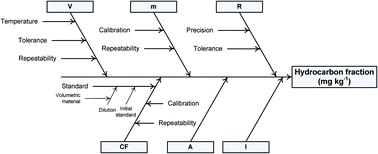An analytical method for quantifying petroleum hydrocarbon fractions in soils, and its associated uncertainties†
Abstract
This paper proposes a method for measuring total petroleum hydrocarbons (TPH) and other hydrocarbon fractions in soils, and discusses its uncertainties. In this method, hydrocarbons are microwave-extracted from the soil and then subjected to solid phase extraction (SPE). The resulting fractions are analyzed by gas chromatography with flame ionization detection. In tests using reference soil samples of a known TPH content, recoveries were on average 90% for all fractions. The limit of detection for TPH in the tested soils was below 0.2 mg kg−1. Inter-repetition variation in the quantification of aliphatic hydrocarbons was <3%, and <4% for aromatic hydrocarbons. The expanded uncertainty associated with the method ranged from 9% to 15% for aliphatic hydrocarbons and from 19% to 30% for aromatic hydrocarbons. The possible contributors towards the overall uncertainty are discussed.

- This article is part of the themed collection: Emerging analytical methods for global energy and climate issues

 Please wait while we load your content...
Please wait while we load your content...